Table of Contents
Iodine is an essential trace element that combines with the amino acid tyrosine to form thyroid hormones T4 and T3. Thyroxine (T4) contains four iodine atoms, and triiodothyronine (T3) contains three iodine atoms.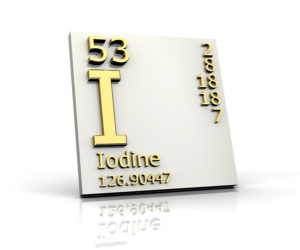
Iodine deficiency is recognized as the most common cause of preventable brain damage in the world. Even moderate deficiency results in a loss of at least 10 – 15 IQ points.[i] And the reason we’ve added iodine to our list of essential nootropics.
Insufficient iodine is not only a problem in developing countries. Studies have found even in Western countries; iodine deficiency has become a critical health problem.[ii]
Your thyroid gland absorbs iodine from your blood supply to make and release thyroid hormones. Your thyroid affects every cell in your body and brain through the hormones T4 and T3.
Within your brain, T4 is converted to T3 by selenium which then affects gene expression controlling metabolism within cells. And activates the catecholamines dopamine, norepinephrine and epinephrine.
Malfunctioning thyroid function which is often caused by insufficient iodine results in poor cognition, difficulty learning, problems with recall, depression and anxiety.
Iodine helps:
- Neurotransmitters: Iodine is required for the production of thyroid hormones T4 and T3. Thyroid hormone receptors in the brain help regulate the production and use of all important neurotransmitters.
- Brain Energy: Iodine is necessary for the production of thyroid hormones which help control cellular metabolism and energy use within brain cells. Supplemental Iodine usually results in increased energy levels and feelings of well-being.
- Neuroprotectant: Iodine can kill bacteria, fungal infections, and viruses. Iodine will remove fluoride, chlorine and bromine.[iii] And helps your body detox heavy metals like mercury and cadmium that other detox methods can’t remove.
What is Iodine?
Iodine is an essential trace element needed for the creation of thyroid hormones in your body. Iodine combines with the amino acid tyrosine to produce thyroxine (T4) and triiodothyronine (T3).
The most abundant source of Iodine in our diet comes from seafood like kelp, saltwater fish, seal meat, whale meat, oysters, mussels and lobster.
Iodine is also found in beans, milk and milk products, eggs, spinach and vegetables grown in or produced from soil rich in iodine. Typically found near coastal areas of the world.
The most seriously iodine-deficient parts of the world are mountainous and inland areas. Including much of the agricultural producing areas of Western countries like Australia, Canada, USA and Europe.
Iodine is absorbed by your thyroid gland for the production of thyroid hormones. The pituitary gland in your brain releases thyroid stimulating hormone (TSH) instructing your thyroid to release T4 and T3.
T4 and T3 are produced by combining tyrosine (thyroglobulin) with iodine and released into your blood stream. Thyroid transport proteins then carry the hormones to target cells all over your body including your brain.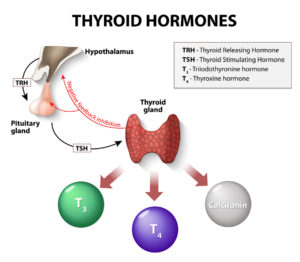
Nearly all of your body’s functions in nearly every tissue rely on thyroid hormones. Their actions and influence are so wide ranging that you cannot live without them.
Thyroid hormones affect brain development, heart rate, lung function, blood function, bone growth, steroid hormone production, including the breakdown of sugar, fat and protein. And even some immune processes.
Iodine is even involved in how the other nootropics in your stack are utilized by cells in your brain. The bottom-line is Iodine could be one of the most important additions to any nootropic stack.
How does Iodine work in the Brain?
Iodine boosts brain health and function in several ways. But two in particular stand out.
- Iodine is critical for neurotransmitters. Iodine is required for the production of thyroid hormones T4 and T3. Thyroid hormone receptors in the brain help regulate the production and use of all important neurotransmitters.
Not enough iodine results in too little T3 and T4 in your body. Symptoms of inadequate thyroid hormones (hypothyroidism) include insomnia, fatigue, difficulty concentrating, depression, dry skin and hair, cold sensitivity, frequent and heavy periods for woman, and joint and muscle pain.
- Iodine is required for a healthy immune system. Iodine is antibacterial, antiparasitic, antiviral and has anticancer properties.
Your thyroid is the main storage site for iodine. But this mineral is also concentrated in your glandular system including your salivary and sweat glands. Ovaries, breasts, pancreas, cerebral spinal fluid, skin, stomach, prostate and your brain all contain high concentrations of iodine.
Iodine is a powerful method for removing heavy metals and halides like fluoride, chlorine and bromine from your system. These chemicals compete for the same thyroid receptors in cells used by thyroid hormones. So removing these toxins will help thyroid hormones do their job of gene expression and metabolism.
How things go bad
Iodine is needed by the thyroid to produce the thyroid hormones T4 and T3. Part of the endocrine system, the thyroid secretes hormones that enter your circulatory system. And are transported throughout your body. Every cell has receptor sites for thyroid hormones.
Neurotransmitters are used by neurons to communicate with one another. The presynaptic neuron releases a neurotransmitter which then binds to a receptor on the postsynaptic cell.
Here we’re going to explore how neurotransmitters relate to the endocrine system and thyroid health. And what can go wrong.
Thyroid hormones are involved in the gene expression needed for neurotransmitter release.[iv] Low levels of iodine result in low levels of thyroid hormones which result in low neurotransmitter levels.
Iodine and Serotonin
Several studies have shown that low T3 results in reduced levels of serotonin in the brain. If you don’t respond to SSRI’s for depression it could be due to a thyroid hormone imbalance.[v] The result is depression.
Iodine and GABA
In animals and humans there is a direct link between thyroid levels and GABA. Thyroid hormones affect enzymes responsible for synthesis and degradation of GABA, levels of glutamate and GABA, GABA release and reuptake, and GABA(A) receptor expression and function.[vi]
GABA is your brain’s natural Valium. GABA can help turn off stress after you get upset. Or even prevent a stress response in the first place. Low iodine results in low levels of thyroid hormones affecting GABA. Which can lead to depression or anxiety.
Iodine and Dopamine
Thyroid hormones play a role in dopamine release in the brain.[vii] One study showed that an imbalance between thyroid hormones and dopamine could be responsible for restless leg syndrome.[viii]
Iodine and Acetylcholine
Thyrotrophic-releasing hormone (TRH) increases acetylcholine (ACh) synthesis.[ix] One study showed that those with hypothyroidism had significantly decreased acetylcholine in the hippocampus. And that administration of T4 normalized ACh levels.[x]
Insufficient iodine can result in hypothyroidism. And negatively affect ACh synthesis in the brain. Affecting cognition, memory, learning, recall and mood.
Not enough iodine in your diet negatively affects neurotransmitters in your brain. And can result in depression, brain fog, anxiety, learning and memory problems, and ultimately lead to neurodegenerative diseases like Alzheimer’s and Parkinson’s.
Iodine benefits
Most neurohackers associate Iodine with the thyroid because Iodine is needed to produce thyroid hormones T4 and T3. But Iodine is also concentrated in your salivary glands, stomach, breasts, ovaries, eyes and in your brain.
Deficiency in Iodine in any tissue will cause problems in that area of your body. And weaken your immune system. Symptoms of low Iodine show up as brain fog, skin problems, fibroids, fibromyalgia, and chronic fatigue.
Iodine can kill bacteria, fungal infections, and viruses. Iodine will remove fluoride, chlorine and bromine.[xi] And helps your body detox heavy metals like mercury and cadmium that other detox methods can’t remove.
Iodine helps prevent and even reverse breast cancer. And helps prevent mental retardation in young children.
Your brain needs sufficient Iodine for cognition through several mechanisms of action. This essential element is involved in gene expression that controls the synthesis of neurotransmitters in your brain. And how they work.
Iodine helps remove fluoride throughout your body including your brain. Studies show that fluoride can damage your brain, reduce intelligence, and impair memory. Fluoride has even been associated with dementia according to a study by The National Academies of Science, Engineering and Medicine.[xii]
One recent study showed that water fluoridation in England is linked to higher rates of underactive thyroid.[xiii] One of the simplest things you can do to boost cognition and your thyroid is to stop using fluoridated water and toothpaste. And start supplementing with Iodine to remove the fluoride toxicity and boost thyroid health.
Iodine Deficiency Disorders are considered one of the biggest worldwide public health problems today. Studies around the world show none of us are immune from Iodine deficiency. Estimates range from 10 – 90% of the world population don’t get sufficient Iodine depending on where you live.[xiv]
Adding Iodine to your stack if you are deficient is one of the easiest and least expensive ways to prevent and even cure a host of health problems. Including boosting cognition and memory.
How does Iodine feel?
Many neurohackers report an increased level of focus, energy, memory, and cognitive ability when supplementing with Iodine.
You should also experience improved quality of sleep. And have an overall improvement in mood.
Others report a profound difference in energy levels, they are more alert, and fatigue in the afternoon disappears. A few even report a significant improvement in tinnitus.
Iodine Clinical Research
One of most common reasons we use nootropics is to boost memory and mental energy. Memory loss drastically reduces quality of life. And simple brain fog makes it difficult to accomplish the simplest of tasks.
Research has shown that Iodine is involved in memory, learning and cognition on several levels. And supplementing with Iodine is one of the most fundamental things you can do to boost cognition.
Iodine raises the world’s IQ
The world’s greatest concentration of iodine deficient countries in the 1990’s was the former Soviet republics of Central Asia. Worldwide, about 2 billion people or a 3rd of the world population get too little iodine.
Studies show that iodine deficiency is the leading preventable cause of mental disorders. Even moderate deficiency lowers intelligence by 10 – 15 IQ points.
The most visible and severe effects manifest as goiters, dwarfism and cretinism. Ever hear someone use the derogatory term “cretin” to describe someone with low intelligence?
Cretin describes a child born and raised with severe mental disabilities, small stature and weakness all due to not enough Iodine in the mother’s diet when she was pregnant.
 In Japan, people get Iodine from seafood, seaweed, vegetables grown in Iodine-rich soil or animals that eat grass grown in that soil. But even in wealthy nations like the USA and the UK, people still need to supplement. Usually by using iodized salt. Or adding it to their stack as a supplement.
In Japan, people get Iodine from seafood, seaweed, vegetables grown in Iodine-rich soil or animals that eat grass grown in that soil. But even in wealthy nations like the USA and the UK, people still need to supplement. Usually by using iodized salt. Or adding it to their stack as a supplement.
According to Dr. Gerald Burrow, a former dean of Yale’s medical school, “For 5 cents per person per year, you can make the whole population smarter than before”. Simply by adding iodine to the salt supply.
Back in the old Soviet republic, Kazakh children were stunted compared to same-age Russian children. A survey of 5,000 households in 1996 found that 10 percent of children were stunted. And iodine deficiency identified as the main culprit.
In Kazakhstan, Turkmenistan, Tajikistan, Uzbekistan, and Kyrgyzstan campaigns were run promoting iodized salt. Salt companies were persuaded to add iodine to salt before putting it in stores.
In Kazakhstan in 1999, only 29% of households were using iodized salt. Now, 94% of households are. And in 2007, the United Nations certified the country officially free of iodine deficiency disorders.
In raising the world’s IQ, the secret’s in the salt.[xv]
Iodine deficiency and ADHD
A 10-year study conducted in Italy investigated the children born to 16 women from an iodine-deficient area (Area A) and 11 control women in an iodine-sufficient area (Area B).
ADHD was diagnosed in 11 of the 16 children born in Area A but none in Area B. Total IQ score was nearly 20-points lower in Area A children compared to Area B.
The researchers noted that the prevalence of ADHD in children born in Area A could only be compared to similar children with a resistance to thyroid hormones.
And that iodine-deficiency was the likely cause of ADHD due to a critical reduction in intracellular thyroid hormone T3 available to the developing brain.[xvi]
Iodine Recommended Dosage
Recommended Iodine dosage is very difficult because everyone needs different amounts based on your body’s ability to use the Iodine. And the level of exposure you have to daily toxins like fluoride, chlorine, and other halides.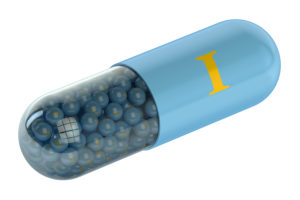
If you are dealing with a severe health problem, then your dosages would need to be higher that someone trying to maintain good health.
Maintenance and for optimal cognition – Natural health doctors have been recommending up to 50 mg of Iodine per day. But I’ve since revised my recommendations based on the latest research and potential health problems caused by iodine toxicity.
The maximum adult dosage for adult is 1 mg Iodine per day. Recommended maintenance dosage is the same.
Cancer – Cancer is a result of mutated cells. Iodine is critical for the P53 gene which prevents damaged cells from dividing.[xvii] Iodine and selenium helps P53 do its job of eliminating abnormal cells. Cancer patients have used 50 – 300 mg of Iodine per day successfully.
Supporting supplements to take with Iodine include:
- Selenium – 200 mcg per day. Selenium is required for the production of T3. And assists in detox.
- Vitamin C – 2,000 – 5,000 mg per day helps support thyroid symporters which transport thyroid hormones through the body including across the blood-brain barrier. And assists in detox.
- Magnesium – 400 mg per day. See my post on Magnesium as a nootropic.
Iodine should be taken with food particularly if you have a sensitive stomach. The supporting supplements can be taken at the same time as your Iodine dose.
Iodine should be taken early in the day because it can increase energy levels so much you could have problems sleeping.
Iodine Side Effects
Most forms of Iodine can cause diarrhea and bloating. Particularly at higher doses. Those with a sensitive stomach could experience stomach pain and is the reason we suggest taking Iodine with food.
It is also possible to overdose on Iodine. So please start at a lower dose and see how your body reacts. Symptoms of Iodine overdose include abdominal pain, delirium, fever, vomiting and shortness of breath.
Iodine is a powerful method for removing toxins and heavy metals from your body which can also produce unpleasant effects. If you experience flu-like symptoms when starting Iodine its very likely you’re feeling the effects of toxins being flushed out of your cells and your body.
For more on Iodine toxicity, here’s information from Nature Reviews Endocrinology.
Types of Iodine to Buy
Iodine is sold in many forms but the main thing to look for; does the product contain both Iodine and Iodide. Your body needs both forms. Breasts look for Iodine and the thyroid needs Iodide. Contrary to some sources; your body cannot convert supplemental Iodine to Iodide.
Also important is to understand and recognize the difference between milligram (Mg) doses vs. microgram (Mcg) amounts. Mcg doses is how most mainstream as well as integrative health practitioners recommend Iodine dosage .
Recommended forms
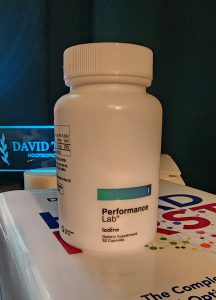 I highly recommend Click for Performance Lab® Iodine which is pure and produced using NutriGenesis® technology which is a highly bioavailable form of Iodine.
I highly recommend Click for Performance Lab® Iodine which is pure and produced using NutriGenesis® technology which is a highly bioavailable form of Iodine.
Other options include:
- Lugol’s liquid – Iodine/Potassium Iodide – 2% and 5% solutions. 2% solution is 2.5 mg/drop and 5% solution is 6.25 mg/drop
- Iodoral – Lugol’s formula in pill form – Iodine/Potassium Iodide – 12.5 mg and 50 mg
- Biotics Research Iodizyme – 12.5 mg per tablet of Iodine/Iodide
- Tri-Iodine by Vitaminlife – 12.5 mg per tablet of Iodine/Iodide
Other forms not recommended
- “Nascent Iodine” which is iodine in its atomic state and is a very low dose. Not enough to detox heavy metals, fluoride, bromine and chloride. Or to saturate tissues.
- Iosol which is Iodine only, and the micro doses have the same issues as Nascent Iodine
- Prolamine which has 3 mg of Iodine and 20 mg of Calcium may be too low to detox the body and saturate tissues
- Pure Encapsulations, Solaray, Source Naturals, Progressive Labs and NOW all offer mcg doses of Iodide only
- Kelp because of low Iodine status, not being able to determine levels of Iodine and possibly toxic due to arsenic and halides
Nootropics Expert Recommendation
Iodine up to 1 mg per day
 I recommend using Iodine as a nootropic supplement.
I recommend using Iodine as a nootropic supplement.
Your body does not make Iodine on its own. So to get its benefits it needs to come from your diet. Or you must take it as a supplement.
Iodine is especially helpful for those dealing with brain fog, poor cognition and memory, low energy levels and a sluggish thyroid.
Iodine is also particularly useful to help rid your body of the daily toxins we’re exposed to every day including heavy metals, fluoride, chloride, bromine and other halides.
While most forms of Iodine are helpful for overall health, keep in mind it’s the thyroid hormones T4 and T3 which influence cognitive health.
Thyroid hormones are produced from tyrosine and Iodine. And the production of T3 from T4 requires selenium which should be a part of your stack when using Iodine.
I recommend an Iodine supplement which contains both Iodine and Potassium Iodide to boost cognition.
Iodine is a fast-acting nootropic that can also help prevent brain degeneration later in life.
I highly recommend Click for Performance Lab® Iodine which is pure and produced using NutriGenesis® technology which is a highly bioavailable form of Iodine.

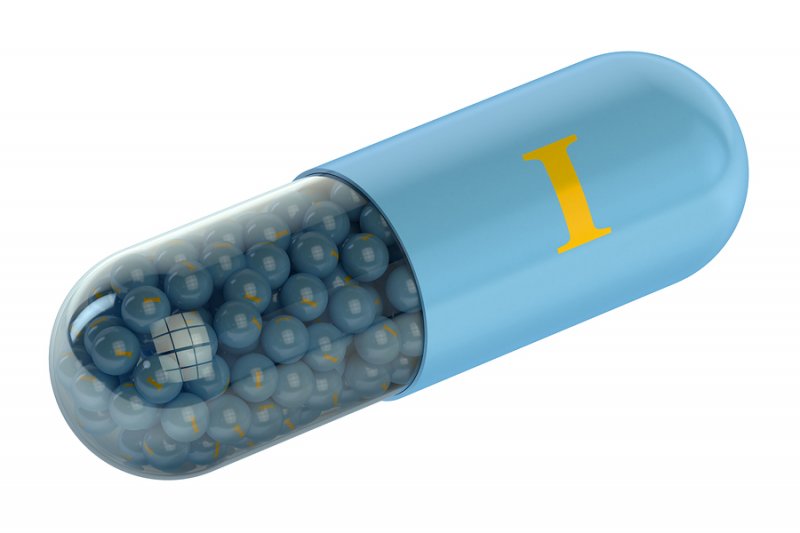







Join The Discussion - 271 comments
Ron
September 14, 2022
Does iodine increase iq 20-15 in adults because to my knowledge that only was valid in kids. I won’t doubt mines increased because I feel sharp
David Tomen
September 15, 2022
Ron, supplementing with Iodine should boost the IQ of anyone at any age. Most are deficient in Iodine because we do not eat enough (if any) seafood.
James
September 10, 2022
Hey David,
Just curious as to what you think of having seaweed for your Iodine source?
e.g. Wakame seaweed seems to have around 400 micrograms of iodine per gram and Kombu has around 1000-2000 micrograms of iodine per gram.
Seems like an incredibly easy and cheap way of getting your Iodine, unless I’m missing something? I do have a microscale so no concerns of having too much
David Tomen
September 13, 2022
James, if you are eating enough seafood every day including seaweed you do not need to supplement with iodine. The majority of people however do not eat seafood period. And those are the ones who need supplemental iodine.
Sandra
September 3, 2022
Hi David!
I Have life problems with high glutamate and low GABA. Taurine, Magnesium, Vitamin D and B vitamin helped. I experimented with other neurotransmitters like catecholamines, Ach and serotonin but messing with them only worsened my PTSD.
I would like to try GABA reuptake. I use 500mcg Potassium iodide daily in tablet form. In this article you mention about 2 forms. Which one I need for GABA reuptake? Potassium Iodide or Iodine???
Thank you!!!! 🙂
David Tomen
September 5, 2022
Sandra, it’s not iodine that is involved in GABA production, now it acts, or its reuptake. It is the thyroid hormone T3 (https://pubmed.ncbi.nlm.nih.gov/16527506/).
But thyroid hormone production starts with iodide (https://www.uptodate.com/contents/image?imageKey=ENDO%2F76931).
James
August 29, 2022
Hey Dave,
Just a quick question about Iodine and your recommended dosage.
Do you know roughly what percentage of Iodine is in household Iodised table salts? In the ingredients, it says that the Iodine source is Potassium Iodate.
Just looking to try to (somewhat) figure out my dosage sizes; e.g. if I were to have 1g Iodised table salt would that equate to 1g Iodine?
Thanks 🙂
David Tomen
August 31, 2022
James, you need to ask the manufacturer to find out the exact iodine dose in their salt. Otherwise we are guessing.
Iodized salt may be enough if you used it daily and long-term. But if you are worried about iodine deficiency the safest long-term solution is an Iodine supplement. That would be one drop of Lugol’s 5% solution every second or third day.
Mike Couch
September 5, 2022
David, I’m in the process of removing the bad Halides from my systems, especially Bromine. I found a source for 20% strength Lugol’s (lugolsnaturals.com), and I’m now taking 200 to 250mg orally per day, 6 days a week. Of course, I take it with 1/2 teaspoon unrefined salt (Redmond’s Real salt), and a 200mcg tablet of Selenium. I don’t have any Herxheimer effects, and have only experienced a few breakouts on my scalp with acne, which is a price I’m willing to pay. I’ve been at this 200-250mg level for about 2 months. Any idea how much longer this will take, or do I just do it until the acne goes away and I can drop back to a daily maintenance dose of 25mg per day?
Thank You
David Tomen
September 5, 2022
Mike, this is above my knowledge level so couldn’t tell you how long it will take to reach you goal for using Lugol’s. You’ll need to ask a naturopath who includes this in their practice.
Gary
August 20, 2022
Question: Are L-Tyrosine and Iodine competitive? Will supplementing tyrosine alone decrease iodine levels?
David Tomen
August 21, 2022
Gary, L-Tyrosine and Iodine are needed to make thyroid hormone. For example T4 is tyrosine with 4 iodine molecules, and T3 is tyrosine with 3 iodine molecules.
Angela Morais
June 8, 2022
Hello!
what is the recommended daily dose of lugol 5% for a person weighing 100kg?
Can I use lugol to detox periodically?
Sorry for my english.
David Tomen
June 8, 2022
Angela, you will get enough Iodine with one or no more than two drops daily unless you are dealing with an iodine deficiency.
cine
May 28, 2022
Hi David,
I have most of the Hypothyroid symptoms for many many years. My TSH, T3, T4, antibodies always show up normal. Haven’t done reverse T3 yet. But this time I tested urine iodine and test result showed low level of iodine 32.7mg/dl. Three days ago, I started Lugol’s Iodine 2% (1 drop now with water,will build up on that), 150ug Selenium (it is also on lower end), Vitamin C,Magnesium daily. So far no side effects. Only that urine has a faint smells of Iodine. Is this initial effect of added iodine or somehow Iodine is coming out of urine? Any urine test strip to help?
David Tomen
May 30, 2022
An Iodine Loading Test is likely the most accurate way to see if you are Iodine deficient. But be careful about “build on that” unless you get a better idea on what your true levels are. A simple urine test is not very accurate. Do a Google search and you’ll find out why.
Forget about TSH to measure thyroid health. What you need are Free T4, Free T3 and Reverse T3. Jamie Bowthorpe has an excellent page on how to read those labs: https://stopthethyroidmadness.com/lab-values/
Cine
June 12, 2022
Thanks for the link. What do you think regarding dried urine test for iodine and creatine?
David Tomen
June 13, 2022
Urine tests are not an accurate way to measure these things because it does not tell you how much of each is in your cells or your brain
Jill
May 13, 2022
Hello David,
It was suggested to me to take lugols which I have been doing for the last few months with no issues. I have noticed that it helps me to maintain my weight of which I have had trouble in dropping quickly when my anxiety flares up. I am presently now again in a very stressful time and am wondering if increasing my dose would be helpful but am a bit confused with your dosing suggestions. I presently take 2 drops of lugols each morning in about 2tbs of water which I am not sure what the total mg would end up to be that I am ingesting. Any thoughts or suggestions are most welcome as I am looking for all I can do to stop the panic I am in but not take too much of anything to cause my body stress otherwise. I also do take gaba, ashwaganda, rhodiola, B3, omega 3’s (for the EPA), wild mushroom blend, l-theanine and other supplements for general health as well as eating a whole foods gf diet, though still anxiety is consuming my life force. Thank you for your consideration
David Tomen
May 15, 2022
Jill, if it is the 2% solution of Lugol’s and if my math is correct you are currently using about 10 mg of Iodine. Which is considered a pretty high dose.
Iodine is toxic at high doses. The safest thing to do is ask you doc or a nearby lab to do an iodine test: https://emedicine.medscape.com/article/122714-workup#c2 and see what your current levels are.